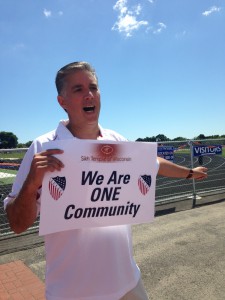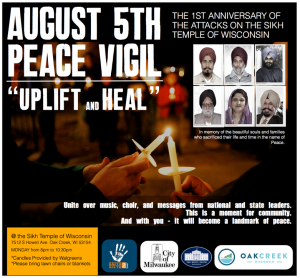Wednesday
Mandala ProjectsSpirit of Chardhi Kala
 Chardhi Kala, a key principle of the Sikh religion, describes a state of mind that does not allow negative emotions to overwhelm one’s outlook and actions. Instead, one cultivates a mind that is filled with joy and dignity. For Sikhs, this state of mind is a sign of contentment with the will of God, even in adversity.
Chardhi Kala, a key principle of the Sikh religion, describes a state of mind that does not allow negative emotions to overwhelm one’s outlook and actions. Instead, one cultivates a mind that is filled with joy and dignity. For Sikhs, this state of mind is a sign of contentment with the will of God, even in adversity.
article by Debbie Zarate, Milwaukee Center Director
edited by Jayne Sutton, Shambhala Times Volunteer Editor
photos from The Chardhi Kala Memorial 6K Run/Walk
On August 5, 2012, the Sikh Community of Wisconsin suffered a tragic shooting that killed six members. In the aftermath, the spirit of Chardhi Kala inspired them to bravely reach out to the greater Milwaukee community. One result was Serve 2 Unite, an organization whose vision is to foster appreciation, understanding and respect among religious communities and to build a network of interfaith youth leaders to help at-risk communities.
Pardeep Kaleka is the oldest son of Satwant Singh Kaleka, the president and founder of the Sikh temple, slain during the attack. Rahul Dubey viewed Mr. Kaleka as a godfather and was deeply inspired by his example. Navi Gill is Mr. Kaleka’s nephew. These three leaders found the Imagining Peace Conference and Youth Congress with Sakyong Mipham Rinpoche last spring very relevant to their work; thus a supportive friendship between the Sikh community and the Shambhala Center of Milwaukee was born.
Milwaukee Center Director Debbie Zarate shares here a conversation with Pardeep, Rahul and Navi about Imagining Peace and Shambhala.
Debbie: How did you decide to attend the Imagining Peace Program in Chicago?
 Pardeep: We went with Arno Michaelis, a Milwaukee Shambhala member. Once I realized what it was about, it was a no-brainer. Sometimes we imagine peace as adults, but we don’t understand what peace is to a child. That perspective is, I think, crucial. We need to imagine peace where it is most needed.
Pardeep: We went with Arno Michaelis, a Milwaukee Shambhala member. Once I realized what it was about, it was a no-brainer. Sometimes we imagine peace as adults, but we don’t understand what peace is to a child. That perspective is, I think, crucial. We need to imagine peace where it is most needed.
I love the idea that we are basically good people. And the idea of “original peace,” that being angry and hateful is an unnatural state of being. The thought of responding to aggression with anything but aggression is very challenging. I’m so glad that the Sakyong was talking about that.
Rahul: In one of the workshops we learned about imagining peace in the whole society. Everyone in the workshop was from a different culture. So it came down to respecting differences, but also respecting the commonalities. How can we learn from each faith, each stranger? What is peace, goodness? Every faith teaches the same thing: humanity.
Pardeep: For me a highlight was Fleet Maull. I think he quoted that in the US $70 billion goes to maintain the prison-industrial complex: warehousing people for profit. The motive to run this as a business is a cause of suffering. Probably a different model, like restorative justice — where if someone does harm, somehow they have to make restoration — would be the better way to do it. I think Sikhism has a way of concentrating on restorative justice.
There are stories about the first guru, Guru Nanak, and a thief, Sajin. Guru Nanak goes to stay with Sajin even though he knows that people who did could end up dead. But Guru Nanak felt that Sajin didn’t want to be a thief — he wanted to give it up and be a good person. He catches Sajin and asks him, “is this what you really want to do?” He replies, “No, but how can I change?” Guru Nanak says “First, confess completely to everything you have done. Second, bring everything you have gained by illegitimate means — we will share it with the poor. Third, dedicate the rest of your life to doing good and making a difference.”
Debbie: How did you find it in yourselves to move forward this past year, after such a tragedy?
 Pardeep: If we said we aren’t angry about what happened, we would be lying. But we have a phrase, Chardhi Kala. It means that if you live with high spirits, you can make something bad into something good. Hate is almost a waste of emotion. It’s a natural emotion, and so is anger, but to let that drive you is not good. That’s what we’re trying to teach the kids we work with, and that’s the point of the Imaging Peace Conference. If you let anger and hate override everything, there is nothing positive you can do with it.
Pardeep: If we said we aren’t angry about what happened, we would be lying. But we have a phrase, Chardhi Kala. It means that if you live with high spirits, you can make something bad into something good. Hate is almost a waste of emotion. It’s a natural emotion, and so is anger, but to let that drive you is not good. That’s what we’re trying to teach the kids we work with, and that’s the point of the Imaging Peace Conference. If you let anger and hate override everything, there is nothing positive you can do with it.
The other part of it is that for Rahul and me, the people who passed away — the victims, my dad — are all inspirations. A couple of kids who were inside when my dad was dying told me that they spotted my father on the ground, and he was chanting our prayer: “Waheguru, Waheguru, Waheguru,” which calls out to the guru. He wasn’t praying for himself, he was praying for the world. He was chanting and trying to send out good energy. I know that all those victims, with their last breath, were chanting for a better world.
Navi: My uncle taught that if a person is honest with himself and others, he doesn’t have to lie. And that he should give back part of what he earns to the community. That is a true person. That is a true Sikh. There should be something good to come from this. We all have to come together; it’s about time. We have created this mess; we have to clean our own house.
Pardeep: Awareness about Sikhs was brought to the forefront after August 5. I think the attack came from sheer ignorance and hatred. Although the shooter was targeting Sikhs, he could have targeted anybody. He just attacked “the other.” We need to start minimizing differences and maximizing similarities. This why we started Serve 2 Unite, and attended the Imagining Peace conference.
Debbie: Can you say more about the principle you brought up earlier, the idea of the energy of positive inspiration?
 Rahul: Chardhi Kala is about a state of joy despite negative circumstances. It can be translated as relentless optimism, or resilience. We planned The Chardhi Kala 6k Run/Walk: Turning Tragedy into Triumph as a memorial to honor the shooting victims. It celebrates a positive result of this tragedy, which is that our greater Milwaukee community has grown closer and more aware.
Rahul: Chardhi Kala is about a state of joy despite negative circumstances. It can be translated as relentless optimism, or resilience. We planned The Chardhi Kala 6k Run/Walk: Turning Tragedy into Triumph as a memorial to honor the shooting victims. It celebrates a positive result of this tragedy, which is that our greater Milwaukee community has grown closer and more aware.
Kala, from Sanskrit, means “energy.” Chardhi in Punjabi means “rising, ascending.” So, Chardhi Kala is an intensely energized, ever-ascending state of the spirit of an individual or group. It is characterized by faith, confidence, cheerfulness, courage, fortitude, discipline and resolute willingness to uphold cherished ideals even in the face of the most daunting challenge. “Abiding cheerfulness” is its hallmark — Nanak Naam Chardhi Kala, Tere Bhane Sarbatt da Bhalaaat.
Debbie: That is a very beautiful principle that resonates deeply with many of our Shambhala aspirations. What did you think about the idea of original peace and working together as an enlightened society?
Rahul: It is the theme of inner peace leading to outer peace. You have to recognize peace in yourself first, as the Sakyong says. So you have to find your inner self and then devote yourself to the community. I would like to interact more with Shambhala and learn more about this faith.
Navi: It is very interesting that even though Shambhala is so young, you are able to come together from all over the world, and have the insight that you have.
Pardeep: We appreciated the program and we would love to be a part of it again. For the students, it is very good to be able to relate to someone who has gone through this transformation. If we are going to make this world safer, we have to reach out to those who are suffering.
Debbie: You shared with me earlier that after last year, you felt the need to go out into the larger world and engage.
 Pardeep: If you aren’t an actor you can’t be a factor, right? I used to be a police officer, and I was also a teacher. I have always believed in the idea of service. But I believed in it even more after this happened. Since this event we have tried to bring more awareness.
Pardeep: If you aren’t an actor you can’t be a factor, right? I used to be a police officer, and I was also a teacher. I have always believed in the idea of service. But I believed in it even more after this happened. Since this event we have tried to bring more awareness.
Navi: Before the shooting, most of us didn’t participate in the greater community; whatever time we had, we devoted to our temple or to members of our community. But we have felt so much support from everyone that we feel compelled to give back.
Pardeep: Part of who you are is what you do, not just what you believe in. The way you spread your ideals — and that’s probably the most important part of a religion — is through your actions. That’s how people find out just how great other cultures can be, and not just Sikhism.
All religions go through transformational periods. I think Sikhism’s transformative period is now. In the next 50 years religions are going to find that they share more commonalities than differences, and people will concentrate on that. They will have to.
Rahul: Religion should be a source of strength, not a weakness that causes us to fight each other. Human nature is bigger than the divisions. There is something binding us that is bigger. What the Sakyong says about basic goodness, humanity, aligns the other religions.
Debbie: Thank you for taking the time to share these beautiful thoughts. It has been an honor.
The Chardhi Kala Memorial 6K Run/Walk was held on August 2, 2013. Members of Team Shambhala-Milwaukee ran in support.
To support the Chardhi Kala Run/Walk: www.chardhikala6k.org
To learn more about Serve 2 Unite: www.serve2unite.org
















